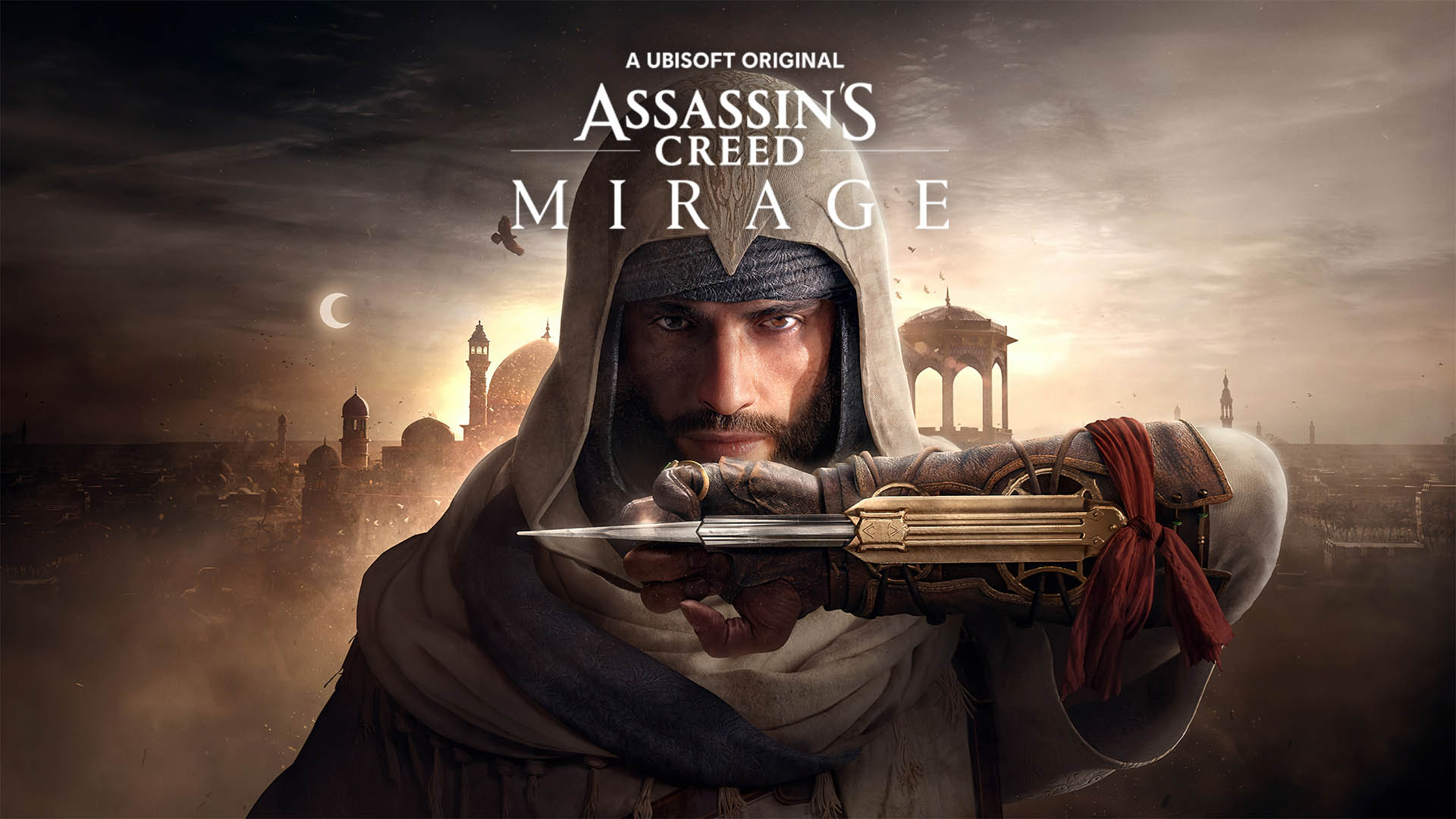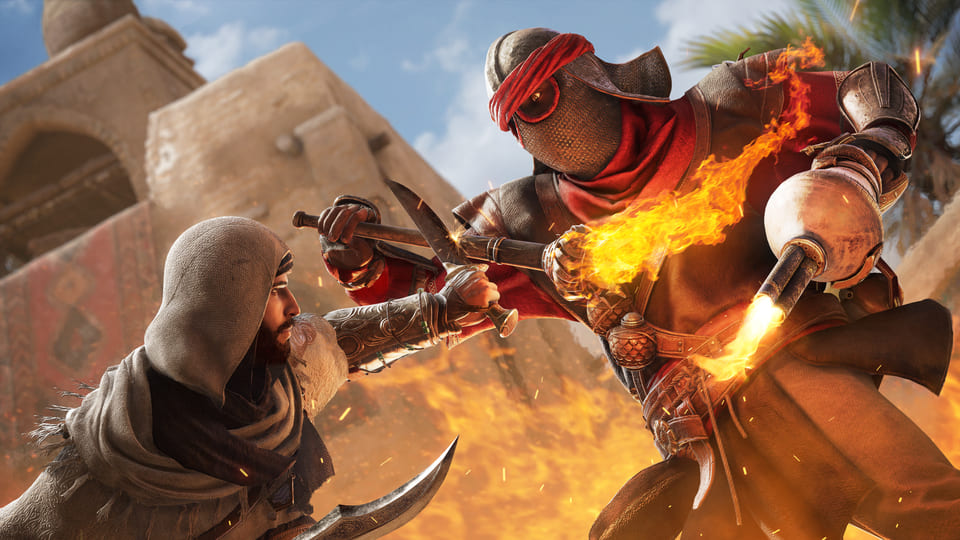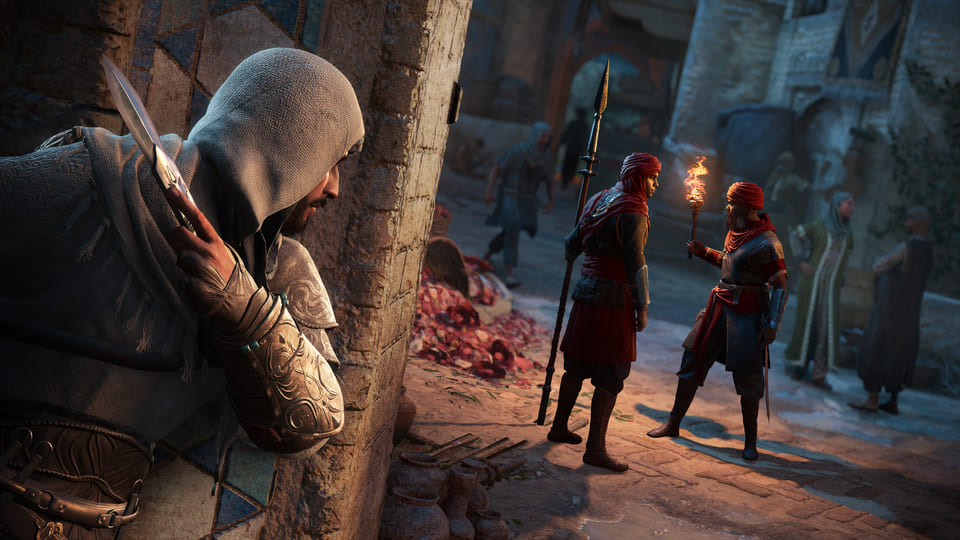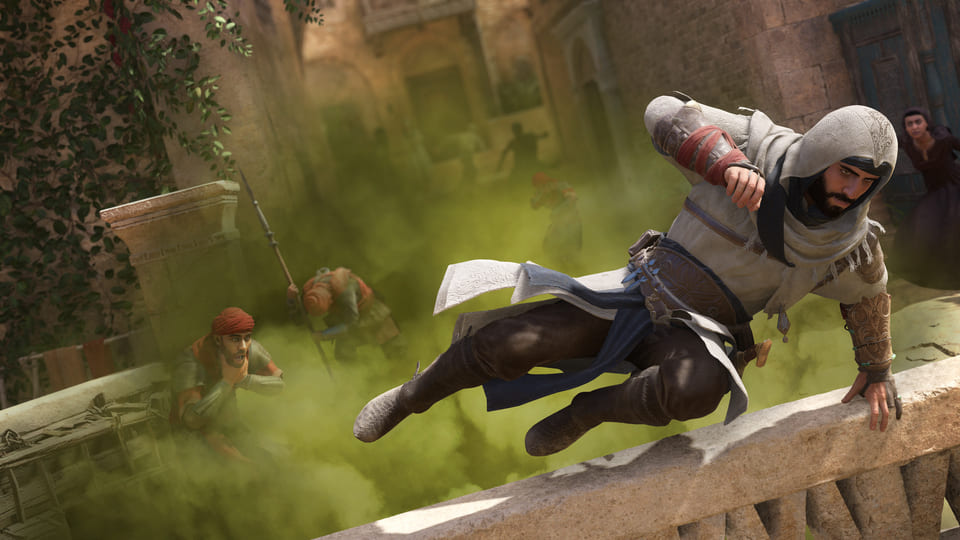
Assassin’s Creed Mirage is the latest iteration of Ubisoft’s long-running Assassin’s Creed franchise, and after the juggernaut that was Assassin’s Creed Valhalla, Mirage looks to be a bit of a respite that strips the game back down to its roots. Set in the 9th century Abbasid Caliphate (Arabian Empire), players follow an assassin named Basim Ibn Ishaq on his journey from being a petty street thief to becoming a member of the assassin order known as The Hidden Ones (the precursor to the Assassin’s Order).
Promising a more “intimate” experience, Assassin’s Creed Mirage looks to be not only a budget title – but thankfully a much leaner experience. Spoiler warning: I don’t usually do this, but the ending of this game is cryptic and only makes any semblance of sense if you have played Assassin’s Creed Valhalla to completion. You can play this game without any prior experience with the franchise but be prepared to ask about 9734 questions if you do.
This is a review coupled with a supplemental video review. You can watch the video review or read the full review of the below:
Assassin’s Creed Mirage
Developer: Ubisoft Bordeaux
Publisher: Ubisoft
Platforms: Windows PC, Xbox One, Xbox Series S|X, PlayStation 4, PlayStation 5 (Reviewed)
Release Date: October 5, 2023
Price: $49.99 USD

Let’s face it: Assassin’s Creed has become more bloated than your Great Aunt Ethel after Thanksgiving dinner. Steadily adding more and more mechanics and artificially inflating the length of playtime by adding a plethora of side quests, mini-games, and so many map icons that it’s hard to tell where anything is without hiding at least half of them, the “Ubisoft” formula of trying to keep players involved in their respective universes has become increasingly more stale.
I never thought I’d say this, but Mirage is quite literally a breath of fresh air, streamlining everything you’ve come across throughout the franchise, and whittling everything down into a nice tight package. Basim has an assortment of tools available at his disposal, three different skill trees that all have a handful of upgrades to choose from, and perhaps the absolute best thing: there’s no present-day Animus slogfest to chug through in order to stay engaged with the meat and potatoes.

Unfortunately, every step Mirage takes in the right direction firmly reinforces how desperately the franchise has weaved itself a pretty coat that cocoons a hollow husk on the inside. Basim’s story starts off strong as he watches his father disgraced after someone else steals the credit for his work, he decides he’s going to join The Hidden Ones and fight injustice for people like his dad.
He and his childhood friend Nehal have a few minutes to build a rapport with each other and set the groundwork for their relationship, and there’s a bit of light investment with the local village before they overhear talks of the Caliph getting a delivery of a rare treasure that’s sure to make The Hidden Ones notice him if he’s able to nab it. They break into the palace and steal the disc, but the Caliph catches them and is ultimately murdered in self-defense as they escape the palace.
Eventually, Basim meets Roshan, the mentor of The Hidden Ones, and he’s eventually permitted to come and train to become an assassin. Fast forward a bit and then you’re dumped into a painfully dull 12-14 hours of seemingly uninteresting investigation missions, as you work to unravel the clues that ultimately lead Basim to the leader of Baghdad’s Order of the Ancients (these are the precursors to The Templars).
After a few years of training, Basim eventually crosses paths with Nehal again, but she’s almost antagonistic, leading you to believe there’s a lot more to their relationship than meets the eye. Basim can also accept contracts which are essentially side quests that reward the player with tokens for the different factions you’ll find in Baghdad, as well as skill points and money/crafting components.
The tokens are used to bribe merchants for better prices (though they also are consumed to open merchant-locked chests hidden around the area), while Scholar tokens are used to bribe people for information, and there’s a token you give Mercenaries to go pick fights with guards in order to cause a distraction too but they’re almost entirely worthless aside from a very few points in the story when they come in handy.
They can just as easily and quickly be pickpocketed from random people walking around in each area, and it’s significantly faster than trying to perfectly complete a contract with a hidden “bonus” for better rewards that are almost never actually worth taking the extra time for.

In fact, almost everything about Assassin’s Creed Mirage is extremely bland. While Baghdad itself is absolutely gorgeous and fun to explore (I’ve got around 35 hours played – 15 of which aimlessly exploring and looking at the architecture), the gameplay itself is uninteresting as you can’t do a lot of the things that you’ve been able to do in previous entries, and while there are some cool tricks like throwing your daggers while suspended in mid-air, the most useful thing Basim could have had would have been Ezio’s double hidden blade simply to perform double assassinations.
I know, it hadn’t been invented yet at the time this game takes place, but there are already other anachronisms that plague this game – so a double hidden blade would have been considerably less eye-rolling when you consider that this game has a trap that not only sprays poison when triggered but can literally be detonated in proximity by whistling. I appreciate the idea of Mirage being a stripped-down “greatest hits” type of game as there are pieces from the original Assassin’s Creed here as well as Unity and Valhalla, but it all feels held together with Scotch Tape and Elmer’s Glue.
The best parts of Assassin’s Creed Mirage are the first and second half of the third act – as near the end, you’ll infiltrate a Harem and meet a character named Makira who’s one of the very few memorable characters throughout the entirety of this 20-hour adventure. She’s delightfully shy and coy, only to surprise you and she’s honestly what pulled me back in hard enough to finish up the story.
The writing in that series of missions is probably the best in the game, and that’s pretty sad considering it isn’t anything groundbreaking or all that surprising. Just a memorable character interaction that feels like it was given more than a few minutes of thought to write up. That thought is ultimately where we conclude.
While Assassin’s Creed Mirage is a short experience, it feels like they had about four hours or so story and stretched it out by adding 16 hours of busy work in the middle. None of the characters you’ll engage with from The Order of the Ancients are memorable, and by the time you even remember their names, you’ve killed them and moved on to the next target. Ultimately, none of them except the leader ever matters, and even then not really as it’s just all an elaborate but poorly crafted vehicle to move the story from its interesting opening to its questionable conclusion.
Assassin’s Creed Mirage is probably the most appropriately named game in the series because you thought you were getting a full story, but really all you’re getting is another standalone Assassin’s Creed Valhalla DLC pack with a $50 price tag.
Assassin’s Creed Mirage was reviewed on PlayStation 5 using a code provided by Ubisoft. Additional information about Niche Gamer’s review/ethics policy can be found here. Assassin’s Creed Mirage is now available on PC via Uplay or Epic Games Store, Xbox Series X|S, Xbox One, PlayStation 4, PlayStation 5.